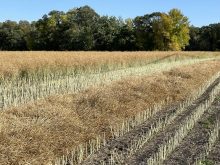Farmers pay for Canadian Grain Commission (CGC) operations so they should have a bigger say in how it operates, says Rick White, chief executive officer of the Canadian Canola Growers Association (CCGA).
“It’s (CGC) a Government of Canada agency and farmers are paying full freight on it now (because of cost recovery),” said White during a formal address at Ag Days Jan. 19.
“It’s one thing to go to full cost recovery, but full cost recovery with absolutely no (farmer) control and no representation around that government agency is not right. And so we are pushing the government hard when it starts to revisit this again.
Read Also

Manitoba canola embattled by verticillium
Verticillium stripe pressure has been growing in Manitoba, and canola farmers still have precious few tools to protect their crop from the disease.
“We have to do something about that because farmers should not be expected to pay the full shot of a federal government agency. It’s just not right.”
The CGC, which regulates Canada’s grain industry and ensures grain quality, has been recovering 91 per cent of its annual operating costs of $60 million to $70 million through user fees since Aug. 1, 2013. While most of the CGC’s revenue is collected from grain companies, including a $1.80-a-tonne outward inspection fee on grain exports, it’s widely accepted that companies pass the charges back to farmers.
The government contributes around $5.2 million a year to fund the CGC’s Grain Research laboratory, which does work seen as benefiting Canada.
In an interview, White suggested the CGC become a Special Operating Agency.
“There’s tremendous expense running a government agency by the nature of government,” he said.
CGC governance should also change, White said. Instead of the government appointing a chief commissioner, an assistant commissioner and a commissioner, it should appoint a full-time chief executive officer and create a board of directors made up mainly of farmers, he said.
“They (CGC) do a lot of good work,” White said. “It’s not a criticism, it’s just the model is wrong. It’s not accountable to farmers and it’s the farmers who pay the bill.”
The other option is for the government to cover most of the CGC’s operating costs as it once did, he said.
Unsuccessful lobby
Farmers and grain companies argued unsuccessfully that since many CGC services are compulsory and benefit Canada’s economy, the government should pay for them.
Interestingly, the CGC became a Special Operating Agency (SOA) in 1991 under the Mulroney Progressive Conservative government. It said the change would give the CGC more flexibility, including the ability to borrow funds.
Last week a CGC official said he didn’t know when the agency, which reports to the agriculture minister, ceased being an SOA.
In the late 1990s, the Chrétien government proposed scrapping the commissioner model in favour of a president-CEO and board of directors. But it never happened.
The Harper government brought forward a similar plan, along with other proposed changes to the Canada Grain Act and CGC in several bills that were never passed. However, in its last bill on the matter, C-48 introduced more than a year ago, the government dropped the proposal.
“I’m a firm believer in if it ain’t broke don’t fix it,” then agriculture minister Gerry Ritz said in an interview Jan. 9, 2015.
“We’ve got a good working relationship across the spectrum with the three commissioners. Each one brings different expertise to the fore. To limit that to a president and some other people under him doesn’t have the same effect.”
The CGC’s most recent chief commissioner, Elwin Hermanson left the position Jan. 20 after serving eight years and declining another term. He said governance is up to the new government. However, he added, “make sure the (CGC) leadership is close to the industry and particularly close to the producer.
“That has been a strength of the CGC. Most commissioners have been farmers or industry-oriented people as opposed to career public servants. I have nothing against career public servants — we work very well with them — but for the CGC it has set us apart and given us access and impact in the industry that has benefited producers and every other sector of the industry. I’d like to see that maintained.”
Hands on
Farmer directors wouldn’t be as hands on as the current full-time commissioners, two of whom historically have been farmers, including Hermanson.
There have been whispers that commissioner governance sometimes makes for internal power struggles and isn’t as efficient as the more hierarchical CEO-board structure. But after Ritz’s long fight with the Canadian Wheat Board’s directors, the majority of whom was elected farmers, over its sales monopoly, it’s not surprising he changed his mind.
The CCGA will push the new Liberal government to pick up where the last government left off with changes to the CGC, White said.
C-48 also proposed to extend a farmer’s right to get the CGC to grade and determine dockage when the farmer and buyer disagree. Farmers have that option now when they deliver to primary elevators, but not with processors, including crushers. Half of Western Canada’s canola is crushed domestically, White said.
The bill also proposed setting up a new program to protect farmers when grain buyers fail to pay for grain. A fund, paid for by grain companies, would cover farmer liabilities. White said the new system would be cheaper than the existing one, which requires grain companies to post security to cover their liabilities. In the past, despite CGC monitoring, some grain companies failed to post enough security to cover all what farmers were owed.
The former government also planned to require feed mills, which currently are not part of the program, to participate.
















